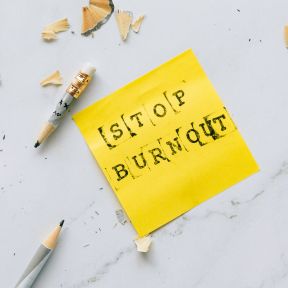STRESS- 5 More Ways to Beat Burnout. Strategies for taking control of your stress.

KEY POINTS-
- Burnout can occur in all areas of your life, not just at work.
- To beat burnout, the underlying chronic stress must be resolved.
- Burnout does not get better on its own: Ignoring or suppressing burnout is never effective.
In my previous post, 10 Ways to Beat Burnout, I suggested techniques for dealing with the chronic stress that underlies burnout, which can occur in any aspect of your life (not just at work).
In this follow-up post, I briefly cover 5 additional methods to mitigate stress that can further help beat burnout.

- Manage your daily productive window. Research clearly demonstrates that we are at our best cognitively for about 4 hours per day (Birkinshaw and Cohen, 2013; Curtin, 2016; Kay, 2023). By understanding when your thinking is most clear, your focus is particularly acute, and your energy is highest, you can tackle your most pressing tasks during this window. This leads to better outcomes, resulting in fewer errors and mistakes, and ultimately provides more satisfaction and reduced stress.
- Minimize daily stressors and hassles. We all encounter daily stressors: They are almost a constant daily guarantee. What is important is how we react to them. Often, daily stressors trigger an emotional sympathetic nervous system response that can be difficult to stem. As many triggers are based on repetitive habituated patterns, reflection and preparation can go a long way to mitigating daily stressors. First, identifying what can trigger you and why it elicits an emotional response are important initial steps. Coming to an understanding of your common triggers gives you a sense of control over the situation and your reaction, which is stress reducing in and of itself. Second, preparing a plan to mitigate the trigger enables you to further your locus of control and anticipate your stress response to these scenarios, helping you to proactively avoid the stressor altogether. Finally, the best plan in the world is not helpful if it is not executed. So put the plan into effect and stick with it, making revisions as necessary.
- Place it in perspective. Whatever is triggering you is most likely to be blown out of proportion, even to the point of becoming maladaptive. In other words, you may be consciously or unconsciously making a mountain out of a molehill! In this situation, it is helpful to reframe the thought patterns and objectively consider what the likely ramifications of the situation are. It is well established that when we worry about something, the end result is almost never as intense or negative as what we imagined (Gillihan, 2019). Worrying causes the mountain to grow! Another helpful approach is to ask, "Will this situation still matter to me over time?" If the answer is no, then the situation may not be as important as the stressful thinking may indicate, allowing you to place it into a more realistic, and less stressful, context.
- Manage your hormones. By definition, stress always impacts your hormones. When the amygdala initiates the sympathetic nervous system and hypothalamus-pituitary-adrenal axis, one of the main ensuing actions is the secretion of cortisol, testosterone, estrogen, oxytocin, and other hormones. What is less understood is that conversely, hormone imbalances create stress, particularly by increasing inflammatory molecules (cytokines) circulating throughout your body. As part of your routine health care, making sure that your hormones are balanced to start with can be an effective means for reducing stress. For detailed guidance on this, see my post Blood Test for Stress and Psychological Issues.
- Do not force yourself through it. Suppressing burnout and "pushing through" is our typical response, which I refer to as "grin and bear it" (see my post Fight or Flight is Just One Part of Stress Reactivity). Let's be honest, sometimes we do in fact have to push through stress and burnout, or "suck it up." When stress is on an acute basis, this can be a necessary and even effective technique. However, for chronic stress that leads to burnout, this is almost never an effective strategy. Chronic stress that is not managed produces a cumulative effect that will impact all areas of your life and can contribute to psychophysiological disorders (Harrison, 2017; Rodriguez et al., 2018; Straub & Cutolo, 2017). Taking the time to understand, prepare, and execute strategies to resolve your chronic stress is always more effective than sucking it up.
By using just one of these techniques (or my previous 10) you can dramatically improve your ability to reduce real and perceived stress and beat burnout!
Most importantly, just do something constructive. Stress and burnout will not go away on their own. Take control!
Site içinde arama yapın
Kategoriler
- Questions and Answers
- Opinion
- Story/Motivational/Inspiring
- Technology
- Art
- Causes
- Crafts
- Dance
- Drinks
- Film/Movie
- Fitness
- Food
- Oyunlar
- Gardening
- Health
- Home
- Literature
- Music
- Networking
- Other
- Party
- Religion
- Shopping
- Sports
- Theater
- Wellness
- News
- Culture
- War machines and policy
Read More
Top Vastu Shastra Courses Online - Online Vastu classes to enhance your knowledge and skills.
The Top Vastu Shastra Courses Online offer a comprehensive approach to learning Vedic...
Schistosomiasis Treatment Market Providing Deeper Insights By 2029
Schistosomiasis Treatment Market research report deals with many parameters in depth to satisfy...
Navigating Change: Menopause Treatment Market Size Insights
The Menopause Treatment Market Size is experiencing a significant surge globally,...
Smart Biosensors Market Developments, Future Plans, Comprehensive Research and Competitive Landscape
The Smart Biosensors market is anticipated to reach USD 27.21 Billion by 2032 at 6.9% CAGR during...
Find the Perfect Job: How Staffing Agencies in Etobicoke and Brampton Can Help
Finding the perfect job can be a daunting task, especially in today’s competitive job...

